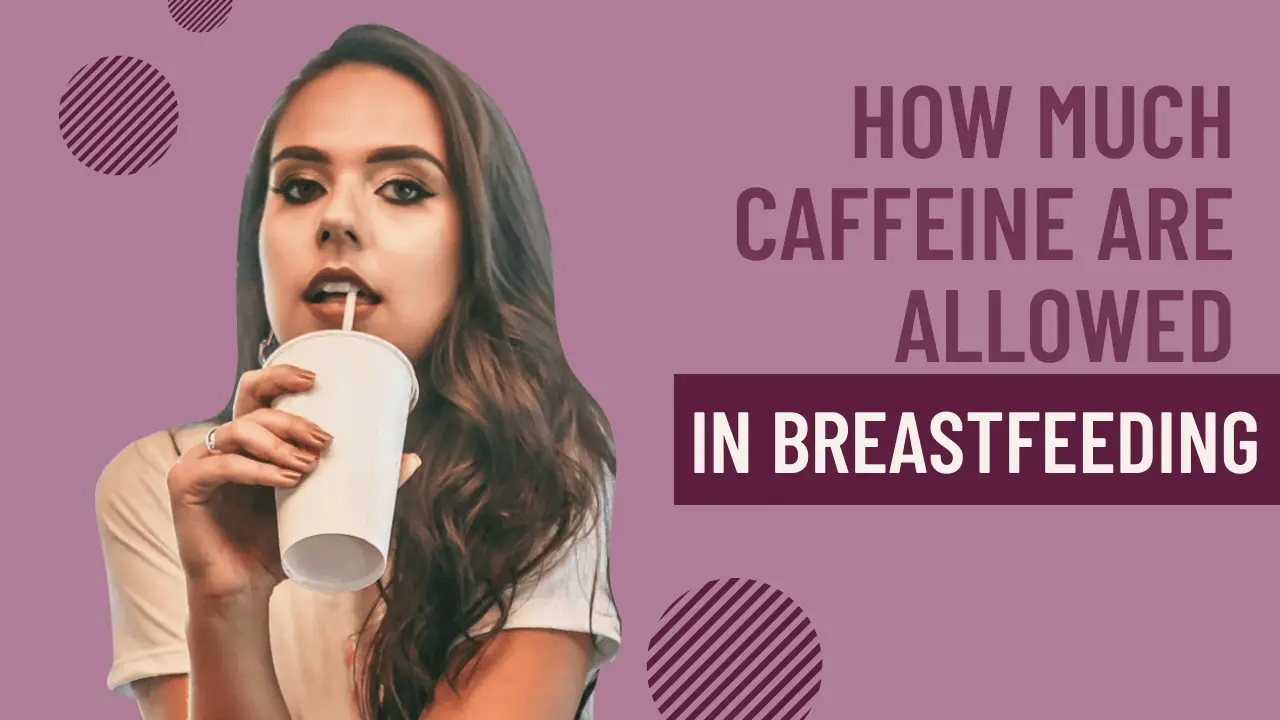You can be a new mother and wonder how your food choices affect your infant who is being breastfed. Caffeine consumption, which is a common worry for many people, is a daily routine staple. How much caffeine are you allowed when breastfeeding? may be on your mind.
It is critical for your health and the health of your unborn child to know the appropriate limits for caffeine consumption. While moderate caffeine use is generally regarded as harmless, excessive caffeine intake may cause fussiness, poor sleep patterns, and irritability in newborns.
Additionally, caffeine can transfer into breast milk. In order to protect your baby’s health and your own peace of mind, this blog post will discuss the rules and suggestions regarding caffeine use while nursing.
How Caffeine Affects Breast Milk:
When a nursing mother consumes caffeine, it finds its way into her breast milk. Even though it is just 1% of the mother’s intake that is passed, over time it can build up in the baby’s system, particularly in preterm and newborn infants.

For some infants, this can result in hyperactivity, sleep problems, fussiness, and irritability. Furthermore, a mother who consumes a lot of caffeine (more than four to five cups daily) may cause her breast milk’s iron level to decrease.
How much caffeine are you allowed when breastfeeding?
Experts recommend limiting caffeine intake to 300 milligrams per day while breastfeeding. This is equivalent to about 2-3 cups of coffee. However, it’s essential to remember that caffeine sensitivity varies between babies.
Some infants may be more affected by even small amounts of caffeine. Therefore, it’s crucial to monitor your baby for any signs of caffeine sensitivity and adjust your caffeine intake accordingly.
Recommended Caffeine Limits:
Understanding the recommended caffeine limits is crucial for breastfeeding mothers who wish to enjoy their daily cup of coffee without compromising their baby’s health. While caffeine does pass into breast milk, moderate consumption is generally considered safe for most breastfeeding mothers and their infants. However, it’s essential to know the guidelines and adjust your intake accordingly.

General Guidelines for Caffeine Intake
- Daily Limit: Health experts, including the American Academy of Pediatrics and the La Leche League, suggest that breastfeeding mothers can safely consume up to 300 milligrams of caffeine per day. This is approximately equal to two to three cups of coffee.
- Individual Sensitivities: Some babies may be more sensitive to caffeine than others. It’s crucial to monitor your baby’s behavior and adjust your caffeine intake if you notice signs of irritability, poor sleep patterns, or fussiness.
Sources of Caffeine
- Beverages: Coffee, tea, energy drinks, and certain sodas are the most common sources of caffeine. Pay attention to the caffeine content in each serving.
- Foods and Medications: Chocolate, certain medications, and even some supplements contain caffeine. Check labels to ensure you stay within the recommended limits.
Balancing Caffeine Intake
- Spacing Out Consumption: Instead of consuming large amounts of caffeine at once, try spacing it out throughout the day. This can help reduce the concentration of caffeine in your breast milk at any given time.
- Hydration and Nutrition: Maintaining adequate hydration and a balanced diet can help mitigate any potential adverse effects of caffeine.
To address the question, How much caffeine are you allowed when breastfeeding? adhering to the recommended limit of up to 300 milligrams per day is a good starting point. However, always consider your baby’s reaction and consult with your healthcare provider for personalized advice. By following these guidelines, you can enjoy your favorite caffeinated beverages while ensuring your baby’s health and well-being.
Guidelines for Caffeine Intake:
For breastfeeding mothers, understanding the guidelines for caffeine intake is essential to ensure both their health and the well-being of their baby. While moderate caffeine consumption is generally safe, adhering to recommended guidelines helps prevent potential adverse effects on infants.
Recommended Daily Limits
- Health Organization Recommendations: Major health organizations, such as the American Academy of Pediatrics and the World Health Organization, advise that breastfeeding mothers can safely consume up to 300 milligrams of caffeine per day. This is equivalent to about two to three 8-ounce cups of coffee.
- Individual Sensitivity: Babies metabolize caffeine differently, and some may be more sensitive than others. Monitoring your baby’s reaction is key. Signs of sensitivity include increased fussiness, irritability, and trouble sleeping.
Sources of Caffeine

- Common Beverages: Coffee, tea, energy drinks, and sodas are typical sources. An 8-ounce cup of coffee contains about 95 milligrams of caffeine, while tea ranges from 20 to 70 milligrams per cup, depending on the type and brewing method.
- Hidden Sources: Chocolate, certain medications, and even some herbal supplements contain caffeine. It’s important to read labels and be aware of these hidden sources to avoid exceeding the daily limit.
Managing Caffeine Intake
- Moderation and Timing: Spread out your caffeine consumption throughout the day rather than having it all at once. This can help reduce the concentration of caffeine in your breast milk at any given time.
- Alternative Options: If you find that your baby is sensitive to caffeine, consider switching to decaffeinated beverages or herbal teas that are caffeine-free. Additionally, opting for other energy-boosting alternatives such as taking short walks, staying hydrated, and eating a balanced diet can help manage fatigue.
Monitoring Your Baby’s Response
- Observation: Pay attention to your baby’s behavior and sleep patterns after consuming caffeine. If you notice any changes, consider reducing your intake.
- Consulting Healthcare Providers: For personalized advice, discuss your caffeine consumption with your healthcare provider. They can offer guidance tailored to your specific situation.
To address the question, “How much caffeine are you allowed when breastfeeding?” adhering to the recommended daily limit of 300 milligrams is generally safe. However, individual sensitivity varies, and careful monitoring of your baby’s response is essential to ensure their comfort and health. By following these guidelines, you can enjoy your favorite caffeinated beverages while prioritizing your baby’s well-being.
Effects of Caffeine on Babies:
Understanding the effects of caffeine on babies is crucial for breastfeeding mothers who want to make informed decisions about their caffeine consumption. While moderate caffeine intake is generally considered safe, it’s important to recognize how it might impact your baby and adjust accordingly.
Short-Term Effects
- Irritability and Fussiness: Babies exposed to higher levels of caffeine through breast milk may become more irritable and fussy. This is because their immature digestive systems process caffeine much slower than adults, leading to accumulation in their bodies.
- Sleep Disturbances: One of the most noticeable effects of caffeine on babies is disrupted sleep patterns. Infants may have difficulty falling asleep or may wake up more frequently during the night, leading to overall poor sleep quality.
Long-Term Effects
- Potential Behavioral Changes: While research is still ongoing, some studies suggest that prolonged exposure to caffeine may influence a baby’s behavior and development. It’s essential to monitor your baby’s reactions and consult with a healthcare provider if you notice any concerning changes.
- Sensitivity Variability: Not all babies are equally sensitive to caffeine. Some may show signs of sensitivity even with small amounts, while others may tolerate moderate levels without any noticeable effects. Understanding your baby’s unique response is key.
Identifying Sensitivity
- Observing Symptoms: Watch for signs like increased irritability, hyperactivity, restlessness, and poor sleeping habits. These can indicate that your baby is sensitive to caffeine.
- Trial and Error: If you suspect your baby is reacting to your caffeine intake, try reducing or eliminating caffeine from your diet for a few days to see if there’s an improvement in their behavior and sleep patterns.
Consulting Healthcare Providers
- Professional Advice: If you are unsure about how much caffeine are you allowed when breastfeeding, consulting with a healthcare provider can provide personalized guidance. They can help you determine a safe level of caffeine intake based on your baby’s specific needs and reactions.

By understanding the effects of caffeine on babies, you can make informed decisions about your caffeine consumption while breastfeeding. While moderate intake is generally safe, being mindful of your baby’s sensitivity and monitoring their reactions can help ensure their comfort and well-being.
Managing Your Caffeine Consumption:
Effectively managing your caffeine consumption is essential for breastfeeding mothers who wish to enjoy their favorite caffeinated beverages while ensuring their baby’s well-being. By following some practical strategies, you can strike a balance between maintaining your energy levels and minimizing potential adverse effects on your infant.
Moderation and Timing
- Daily Limit Adherence: To determine “how much caffeine are you allowed when breastfeeding,” health experts recommend keeping your intake to around 300 milligrams per day, equivalent to about two to three cups of coffee.
- Spread Out Intake: Instead of consuming all your caffeine in one sitting, spread it throughout the day. This approach helps maintain lower caffeine levels in your breast milk at any given time, reducing the risk of affecting your baby.
Choosing Alternatives
- Decaffeinated Options: Opt for decaffeinated coffee or tea, which contain minimal amounts of caffeine, allowing you to enjoy your favorite drinks without the associated risks.
- Herbal Teas: Many herbal teas are naturally caffeine-free and make a great alternative. Be sure to check the ingredients to avoid any that might not be safe for breastfeeding.
Monitoring Your Baby’s Reactions
- Observational Vigilance: Pay close attention to your baby’s behavior and sleep patterns. If you notice increased fussiness or disrupted sleep, it may be a sign that your baby is sensitive to caffeine.
- Adjustments as Needed: If your baby shows signs of sensitivity, try reducing your caffeine intake gradually and observe any changes in their behavior and sleep.
Healthy Lifestyle Choices
- Balanced Diet: A well-balanced diet can provide the necessary nutrients and energy you need, potentially reducing the need for caffeine. Focus on foods rich in proteins, healthy fats, and complex carbohydrates to maintain steady energy levels.
- Hydration: Staying well-hydrated can also help combat fatigue. Drinking plenty of water throughout the day supports overall health and can reduce the temptation to reach for caffeinated drinks.
Consulting Healthcare Providers
- Professional Guidance: If you are uncertain about how much caffeine are you allowed when breastfeeding or if you notice persistent issues with your baby, consult a healthcare provider. They can offer personalized advice and help you develop a caffeine consumption plan that suits your needs and your baby’s sensitivity.
By managing your caffeine consumption wisely, you can enjoy your favorite beverages in moderation while ensuring your baby’s health and comfort. Implementing these strategies will help you navigate the challenges of caffeine intake during breastfeeding, allowing for a more balanced and informed approach.
Conclusion:
In conclusion, understanding how much caffeine are you allowed when breastfeeding is essential for the health and comfort of both you and your baby. By adhering to recommended limits, monitoring your baby’s reactions, and making informed choices about your caffeine intake, you can enjoy your favorite beverages while minimizing potential risks.
Always consult with healthcare providers for personalized advice, ensuring a balanced approach to caffeine consumption during this crucial period. Click to learn more.
FAQs:
- How much caffeine are you allowed when breastfeeding?
Breastfeeding mothers are generally advised to consume no more than 300 milligrams of caffeine per day, which is about two to three cups of coffee.
- Can caffeine affect my baby’s sleep?
Yes, excessive caffeine intake can lead to irritability and disrupted sleep patterns in some babies.
- What are some signs that my baby is sensitive to caffeine?
Signs include increased fussiness, restlessness, and trouble sleeping.
- Are there caffeine-free alternatives I can enjoy?
Yes, you can opt for decaffeinated coffee, herbal teas, and other caffeine-free beverages.
- Should I consult a healthcare provider about my caffeine intake?
Yes, consulting a healthcare provider can provide personalized advice based on your and your baby’s specific needs.
